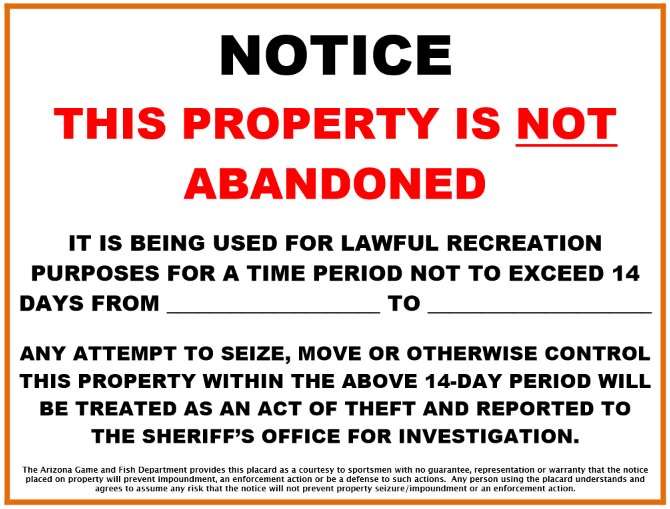Arizona Battles Feds, Again, Over D.C.'s Restrictive Forest-Use Rules

State and federal officials in Arizona are fighting just the latest skirmish in a long-running war over just how restrictive rules should be over human use of forest and desert areas. The locals want fewer and uniform restrictions, while their D.C. counterparts like to play "What will we cite people for this week?" with campers, hunters, and pretty much anybody who likes the outdoors. The most recent battle is over a federal rule-switch, requiring hunters to move their camps every 72 hours. Decades-long practice, as the Arizona Game and Fish Department points out, is to allow campers to stay in place for 14 days.
The terse U.S. Forest Service press release (PDF) that set off the latest kerfuffle reads as follows:
Flagstaff, Ariz. – The Coconino National Forest is asking all northern Arizona -bound hunters to refrain from leaving their trailers unattended in the forest during the upcoming hunting season. In previous seasons, law enforcement officers have found numerous trailers parked in the forests for the purpose of reserving a location for the entire hunting season and also because the individuals did not want to haul their trailers back and forth.
Parking a trailer in the forest for this purpose violates Forest Service regulations. If trailers are left unattended for more than 72 hours, the Forest Service considers them abandoned property and may remove them from the forest. Violators can also be cited for this action. Enforcing these regulations protects the property and allows recreational users equal access to national forests.
This regulation applies to all national forests in northern Ar izona, including the Coconino, Kaibab and Prescott forests.
Unmentioned in the press release is that this is a change in long-standing policy. Everybody in Arizona knows that you're supposed to shift your camp every two weeks. This is to deter people from simply moving into the forest permanently.
It doesn't really work. Plenty of drifters, modern mountain (wo)men, and adventurous types live scattered through the desert and forest in tents, campers, trucks. and caves. Most stick it out during the pleasant weather before moving on, but a few set up fairly elaborate habitations and stay for years. One of my friends (who I'll write about in detail another time) used to work for a year or two, and then take to the wilderness. He lived in one of my tents for a few months after a wildfire cut him off from his main camp.
But you're not supposed to do that. So the two-week rule has a rationale behind it. You can camp, so long as you stop short of digging a root cellar or building a chimney. Parking in the forest during the hunting season and "reserving a location" isn't really an issue because, you know, the forest is big enough for frigging mountain men to hide out in on illegal homesteads.
In a very nice letter (PDF) to the Forest Service, Larry D. Voyles, Director of Arizona Game and Fish, points out that hunting and fishing is actually on the decline across the country, and his department is actually trying to get more people to go out in the forest by reducing and simplifying rules and restrictions.
Having worked as a game warden for more than 30 years, I am aware that many hunters are forced to hunt in chunks of days. Keep in mind that some hunters wait for years, if not decades to be drawn for a particular big game tag. There are many times when a hunter may be in camp for a few days, have to leave for work, and then return a few days later to finish his or her hunt.
So running the risk of a citation or even having expensive gear lifted by the feds is a bit of a downer, however unlikely it is that one or another green-uniformed dickhead will stumble across the camp. He pleasantly requested that the feds return to a uniform 14-day rule across all of Arizona's forests.
No dice. The Game and Fish folks sent out a warning last month that "the Department has met repeatedly with staff from the affected national forests to repeal this enforcement approach, with no success." With the sheriffs departments from Yavapai and Coconino counties, the state developed a placard for people to put on their vehicles, explicitly telling rangers that trucks and trailers have not been abandoned, although Game and Fish warns that the feds may well ignore them.
As I mentioned, this is not the first confrontation between Arizona and federal officials over land-use rules. During the government not-so-shutdown, Coconino County deputies cut the chains on the gate of a facility closed by the Forest Service because the closure was causing traffic jams. Sheriffs went head-to-head with the Forest Service over road closures. And now the whole Arizona Sheriffs Association adopted a formal resolution saying its members oppose and won't help the feds enforce their restrictions, including the new 72-hour rule.
The way things are going, I'm waiting for the first ranger with an attitude to get trussed and thrown over somebody's hood. You don't even need a tag for them.
Have I mentioned that I've written a novel about wilderness-living hermits, crazed rangers and general shenanigans?


Show Comments (19)